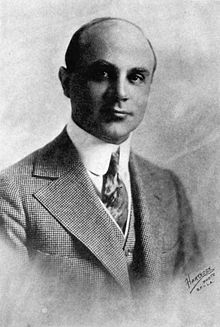Oscar Apfel
Oscar Apfel | |
|---|---|
 Photo of Apfel from The First One Hundred Noted Men and Women of the Screen (1920) | |
| Born | (1878-01-17)January 17, 1878 Cleveland, Ohio, U.S. |
| Died | March 21, 1938(1938-03-21) (aged 60) Hollywood, U.S. |
| Occupation | Actor, director, producer, screenwriter |
| Years active | 1913–1938 |
Oscar C. Apfel (January 17, 1878 – March 21, 1938) was an American film actor, director, screenwriter and producer. He appeared in 167 films between 1913 and 1939, and also directed 94 films between 1911 and 1927.
Contents
1 Biography
1.1 Lasky
1.2 Fox
1.3 Paralta
1.4 Armenian relief
1.5 Final years
2 Partial filmography
3 References
4 External links
Biography
Apfel was born in Cleveland, Ohio. After a number of years in commerce, he decided to adopt the stage as a profession.[1] He secured his first professional engagement in 1900, in his hometown. He rose rapidly and soon held a position as director and producer and was at the time noted as being the youngest stage director in America.[1] He spent eleven years on the stage on Broadway then joined the Edison Manufacturing Company. Apfel first directed for Thomas A. Edison, Inc. in 1911–12,[2] where he made the innovative short film The Passer-By (1912). He also did some experimental work at Edison's laboratory in Orange, on the Edison Talking Pictures devices.[1]
Lasky
When Apfel left the Edison company, he joined Reliance-Majestic Studios, remaining with them eighteen months.[1] In 1913, he became one of two main directors for the Jesse L. Lasky Feature Play Company, the other being Cecil B. DeMille. All the first Lasky pictures were produced under his direction. Among these were the notable successes The Squaw Man (1914), Brewster's Millions, The Master Mind, The Only Son, The Ghost Breaker, The Man on the Box, The Circus Man and Cameo Kirby.[1]
Apfel's directorial collaboration with DeMille was a crucial element in the development of DeMille's filmmaking technique.
Fox
In late 1914, Apfel left the Lasky Company and directed for various companies into the 1920s. His first move was to the producing staff of the William Fox Corporation where he directed a series of pictures in which William Farnum starred. Some of these were A Soldier's Oath, Fighting Blood, The End of the Trail, The Battle of Hearts and A Man of Sorrow.[1]
Paralta
For the Paralta Company, to whom Apfel went after leaving the Fox Corporation, he produced Peter Kyne's A Man's a Man and The Turn of a Card in which J. Warren Kerrigan starred.[1]
Armenian relief
Auction of Souls (1919), a public-awareness picture for the Armenian Relief Committee, was Apfel's work. This production commanded wide attention and attracted great crowds at the special showings which took place at the Plaza and other prominent hotels. The sympathetic interest evoked by its revelations helped in materially adding to the large sums that were subscribed to this cause.[1]
A series of pictures for the World Film Corporation, starring Kitty Gordon, Montague Love, June Elvidge, Louise Huff, and Evelyn Greeley, were also among Apfel's successful productions.[1]
Final years
After many years as a director, he gradually returned to acting. On March 21, 1938, Apfel died in Hollywood from a heart attack.
Partial filmography
The Squaw Man (1914)
Brewster's Millions (1914)
The Master Mind (1914)
The Only Son (1914)
The Man on the Box (1914)
The Call of the North (1914)
The Ghost Breaker (1914)
After Five (1915)
The Little Gypsy (1915)
The Man from Bitter Roots (1916)
The Fires of Conscience (1916)
The Interloper (1918)
Ravished Armenia (1919)
Phil for Short (1919)
Bulldog Drummond (1922)
The Lion's Mouse (1923)
Borrowed Finery (1925)
The Call of the Klondike (1926)
The Heart of Broadway (1928)
True Heaven (1929)
Not Quite Decent (1929)
Abraham Lincoln (1930)
The Right to Love (1930)
Helping Grandma (1931)
Misbehaving Ladies (1931)
Big Business Girl (1931)
Huckleberry Finn (1931)
Five Star Final (1931)
Men in Her Life (1931)
Impatient Maiden (1932)
Business and Pleasure (1932)
Way Back Home (1932)
Make Me a Star (1932)
High Pressure (1932)
One Man's Journey (1933)
Hold the Press (1933)
I Am a Thief (1934)
The Old Fashioned Way (1934) (uncredited)
Man on the Flying Trapeze (1935)
Romance in Manhattan (1935)
Shadows of the Orient (1935)
The Fire Trap (1935)
Crack-Up (1936)
Conquest (1937) as Count Potocka (uncredited)
References
^ abcdefghi Carolyn Lowrey (1920) The First One Hundred Noted Men and Women of the Screen, Moffat, Yard and Company, New York
^ "Oscar Apfel". NY Times. Retrieved March 17, 2015..mw-parser-output cite.citation{font-style:inherit}.mw-parser-output .citation q{quotes:"""""""'""'"}.mw-parser-output .citation .cs1-lock-free a{background:url("//upload.wikimedia.org/wikipedia/commons/thumb/6/65/Lock-green.svg/9px-Lock-green.svg.png")no-repeat;background-position:right .1em center}.mw-parser-output .citation .cs1-lock-limited a,.mw-parser-output .citation .cs1-lock-registration a{background:url("//upload.wikimedia.org/wikipedia/commons/thumb/d/d6/Lock-gray-alt-2.svg/9px-Lock-gray-alt-2.svg.png")no-repeat;background-position:right .1em center}.mw-parser-output .citation .cs1-lock-subscription a{background:url("//upload.wikimedia.org/wikipedia/commons/thumb/a/aa/Lock-red-alt-2.svg/9px-Lock-red-alt-2.svg.png")no-repeat;background-position:right .1em center}.mw-parser-output .cs1-subscription,.mw-parser-output .cs1-registration{color:#555}.mw-parser-output .cs1-subscription span,.mw-parser-output .cs1-registration span{border-bottom:1px dotted;cursor:help}.mw-parser-output .cs1-ws-icon a{background:url("//upload.wikimedia.org/wikipedia/commons/thumb/4/4c/Wikisource-logo.svg/12px-Wikisource-logo.svg.png")no-repeat;background-position:right .1em center}.mw-parser-output code.cs1-code{color:inherit;background:inherit;border:inherit;padding:inherit}.mw-parser-output .cs1-hidden-error{display:none;font-size:100%}.mw-parser-output .cs1-visible-error{font-size:100%}.mw-parser-output .cs1-maint{display:none;color:#33aa33;margin-left:0.3em}.mw-parser-output .cs1-subscription,.mw-parser-output .cs1-registration,.mw-parser-output .cs1-format{font-size:95%}.mw-parser-output .cs1-kern-left,.mw-parser-output .cs1-kern-wl-left{padding-left:0.2em}.mw-parser-output .cs1-kern-right,.mw-parser-output .cs1-kern-wl-right{padding-right:0.2em}
External links
| Wikimedia Commons has media related to Oscar Apfel. |
Oscar Apfel on IMDb
Oscar Apfel at AllMovie
Oscar Apfel at the Internet Broadway Database